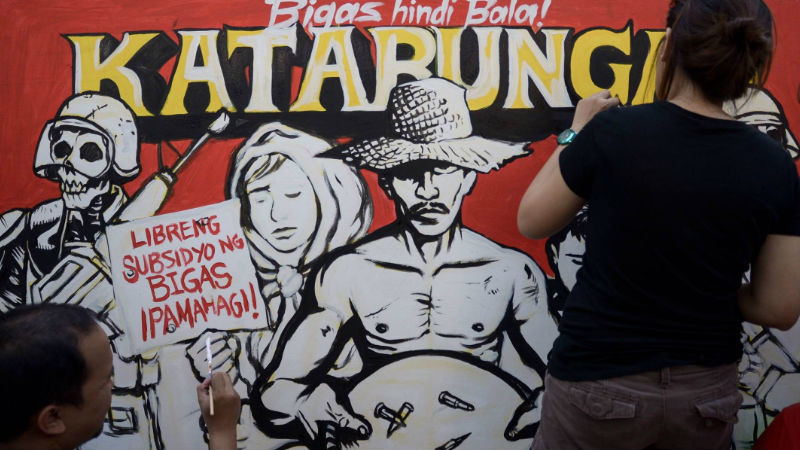
A militant artist group paints a piece on site dedicated to the oppressed farmers of Cotabato, Mindanao at this year’s Art in the Park in Salcedo Village, Makati held Sunday, April 3. The piece titled “Bigas hindi bala” refers to the cry for justice of netizens over the bloody incident in Kidapawan City, which killed three farmers and injured many. INQUIRER PHOTO / ELOISA LOPEZ
Hundreds of politicians are running for office in the May 9 elections unopposed, or virtually so, and that is a danger for democracy.
Exhibit A: North Cotabato Gov. Lala Mendoza, who is running for reelection. Strictly speaking, she has four rivals for the position, but they are all unknown without even a starving farmer’s chance of making it. That explains the astonishing sense of entitlement, the sheer arrogance, of her attitude to those who have the temerity to offer aid to the farmers in the province.
“Bigla kayong darating, magbibigay ng bigas? Nang-i-insulto ba kayo o namumulitiko kayo? (You arrive suddenly, to give rice? Are you insulting us or politicking?)” We realize these intemperate remarks can be misunderstood out of context, but we believe the real context is clear: She felt affronted by the challenge to the way she handled the situation that led to the bloody dispersal of the farmers’ blockade last Friday, and she showed it.
She showed it in part because she does not have to pay for it. Her reelection is that most permanent of conclusions, foregone, and back in office she will not have to account for her conduct until the next election in three years, or unless she faces a legal challenge.
Virtually unopposed, she acts with the bold assurance of a politician certain of the sources of her power—not the support of a plurality or an outright majority of the voters in her province, but the understanding of the political elite in her province that she cannot be defeated at the ballot box.
She is not alone.
All told, 542 candidates for local office are running unopposed, including former president Gloria Arroyo, who is running for a third term as representative of her congressional district in Pampanga; Pampanga Governor Lilia “Baby” Pineda; and Ilocos Norte Governor Imee Marcos. In Metro Manila, six reelectionists face a clear field: Representatives Miro Quimbo in Marikina City, Carlo Lopez in Manila; and, in Quezon City, Winnie Castelo, Jorge Banal, Alfred Vargas, and Kit Belmonte (or in four out of six congressional districts). The storyline is repeated in many other places; in Cavite, for instance, four of the seven districts feature unopposed candidates (three of them reelectionists). In Agusan del Sur, Gov. Adolph Edward Plaza is unopposed; in Agusan del Norte, his two sisters, Ma. Valentina and Evelyn, are running for reelection as representatives, also unopposed.
Several factors explain this disturbing phenomenon.
It is expensive to mount a campaign in the Philippines; but the costs of mounting a challenge to a powerful or entrenched or popular politician often become prohibitive.
There are no real political parties to speak of, and whether on the national or the local level, the political parties accredited with the Commission on Elections depend on the wealth of political clans for their funding.
It is also customary for entrenched politicians to reach an agreement with their equally powerful or well-funded rivals, to divide the offices in a given area between themselves, to avoid the possibility of losing.
Whatever the reason, the results can be dire for the democratic project.
The range of options narrows dramatically, leaving even large constituencies unrepresented. When a politician runs unopposed, or virtually so, only a handful of votes is needed to win the election. So even if, say, the farmers in North Cotabato agree to abstain from voting on May 9 or campaign actively against Mendoza, she will still win as long as she gets more votes than the other candidates.
The quality of public service can deteriorate. It is no coincidence that some of the most economically backward areas in the Philippines are ruled by political dynasties, whose principal goal would simply be perpetuation in power.
Not least, elected official becomes corrupted by power. Acting like monarchs, they see even the offer of aid to their own constituents as a challenge to their legitimacy.
Elections are not supposed to be coronations.